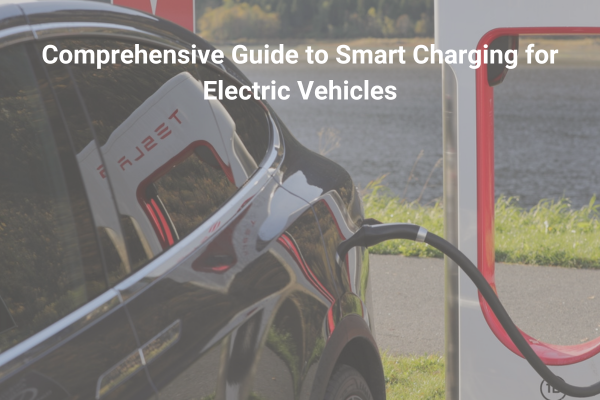Comprehensive Guide to Smart Charging for Electric Vehicles


In this blog, we will explore the empowering role of BMS in driving electric vehicle adoption and revolutionizing the transportation industry.
Electric vehicles (EVs) have gained significant attention in recent years as a sustainable and environmentally friendly alternative to traditional gasoline-powered cars. As the world seeks to reduce greenhouse gas emissions and combat climate change, EVs offer numerous benefits that make them an attractive choice for consumers. Let's explore some of the key advantages of electric vehicles.
Environmental Impact: One of the most significant benefits of electric vehicles is their lower environmental impact compared to internal combustion engine vehicles. EVs produce zero tailpipe emissions, helping to improve air quality and reduce greenhouse gas emissions. By transitioning to electric vehicles, we can significantly decrease our reliance on fossil fuels and contribute to a cleaner and more sustainable future.
Energy Efficiency: Electric vehicles are more energy-efficient than conventional cars. Traditional gasoline-powered vehicles waste a significant portion of the energy generated from burning fuel, whereas electric vehicles convert a higher percentage of stored energy into propulsion. This efficiency translates into lower energy consumption and reduced fuel costs for EV owners.
Reduced Operating Costs: Electric vehicles generally have lower operating costs compared to internal combustion engine vehicles. EVs require less maintenance since they have fewer moving parts and don't require oil changes or regular engine maintenance. Additionally, the cost of electricity for charging an EV is typically lower than the cost of gasoline, resulting in potential long-term savings for owners.
Renewable Energy Integration: Electric vehicles have the potential to integrate with renewable energy sources, such as solar and wind power. By charging EVs with renewable energy, we can further reduce carbon emissions and dependency on non-renewable energy sources. This synergy between EVs and renewable energy promotes a cleaner and more sustainable energy ecosystem.
Noise Reduction: Electric vehicles operate quietly compared to traditional combustion engine vehicles. The absence of engine noise creates a more peaceful and less noisy urban environment, contributing to a better quality of life for both drivers and pedestrians.
Energy Independence: Electric vehicles offer the potential for greater energy independence. With the rise of renewable energy sources and advancements in battery technology, it is possible to generate and store electricity locally, reducing reliance on imported fossil fuels. This shift towards localized energy production and consumption enhances energy security and stability.
Government Incentives: Many governments around the world provide incentives and subsidies to encourage the adoption of electric vehicles. These incentives can include tax credits, rebates, and reduced registration fees. Taking advantage of these incentives can make electric vehicles more affordable and financially attractive for consumers.
The complex nature of developing and manufacturing EVs requires collaboration between various stakeholders, including automakers, battery manufacturers, technology companies, and government entities. Let's explore the importance of collaborations and industry partnerships in shaping the future of electric vehicles.
Technology and Innovation: Collaborations between automakers and technology companies are essential for pushing the boundaries of EV technology. By combining their expertise and resources, these partnerships can lead to the development of advanced battery technologies, more efficient charging solutions, and enhanced vehicle performance. Sharing knowledge and collaborating on research and development efforts can expedite breakthroughs in EV technology and accelerate the transition to a sustainable transportation system.
Charging Infrastructure: Establishing a robust and widespread charging infrastructure is crucial for the mass adoption of electric vehicles. Industry partnerships between automakers, utility companies, and charging infrastructure providers are vital for building a comprehensive charging network. By working together, these stakeholders can coordinate efforts to deploy charging stations at strategic locations, enhance charging capabilities, and improve user experience. Collaborations in this area help alleviate range anxiety, increase convenience, and provide reassurance to potential EV owners.
Standardization and Interoperability: Collaborative efforts are also important for establishing industry standards and ensuring interoperability between different EV components and charging infrastructure. Standardization simplifies the charging process, enables compatibility across various charging networks, and enhances user convenience. By working together, industry players can harmonize charging protocols, communication systems, and safety standards, creating a cohesive and user-friendly EV ecosystem.
Government and Policy Support: Collaboration between industry stakeholders and government entities is essential for shaping favorable policies and regulations that promote electric vehicle adoption. Industry players can work with policymakers to establish incentives, grants, and tax breaks that encourage consumers to purchase EVs. Collaborations can also focus on advocating for increased investment in charging infrastructure, promoting renewable energy integration, and developing sustainable transportation strategies.
Supply Chain Collaboration: The electric vehicle supply chain involves multiple components, including batteries, motors, electronics, and charging equipment. Collaborations between automakers, battery manufacturers, and suppliers help optimize the supply chain, improve production efficiency, and drive down costs. By working together, stakeholders can address supply chain challenges, enhance quality control, and ensure a steady and reliable flow of components to meet the growing demand for electric vehicles.
In conclusion, collaborations and industry partnerships are crucial drivers of progress in the electric vehicle (EV) industry. The benefits of these collaborations are far-reaching, impacting technology development, charging infrastructure expansion, standardization efforts, policy support, and supply chain optimization. By working together, stakeholders can overcome barriers and create an environment conducive to widespread EV adoption.
Embrace the power of collaborations and industry partnerships to drive the electrification revolution forward. Join us in shaping the future of electric vehicles and be part of the sustainable transportation solution. Together, we can build a greener, cleaner, and more connected world. Contact us today to explore partnership opportunities and contribute to the electrified future.